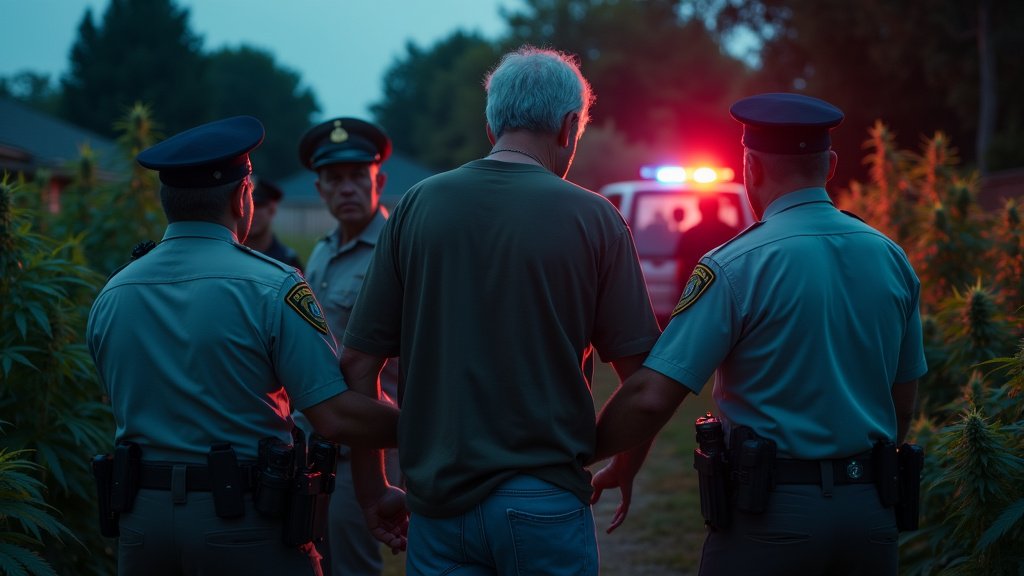In separate incidents on September 2, 2025, law enforcement actions targeting unlicensed cannabis cultivation resulted in the arrest of a 66-year-old man and a manhunt for a 62-year-old suspect. The busts highlight an ongoing concern for authorities regarding the unauthorized growing of cannabis plants, often found in residential settings.
The initial arrest involved a 66-year-old individual apprehended for allegedly cultivating 54 cannabis plants in his backyard. Simultaneously, authorities initiated a search for a 62-year-old man suspected of cultivating 50 cannabis plants on his property. His 82-year-old father is also reportedly facing legal proceedings in connection with the activities. These cases underscore the legal ramifications for individuals engaging in cannabis cultivation outside of regulated frameworks.
The Evolving Legal Landscape of Cannabis Cultivation
The legality of growing cannabis varies significantly by jurisdiction. In many U.S. states, adults aged 21 and older are permitted to cultivate a limited number of cannabis plants for personal use, provided they adhere to specific regulations. For instance, California law allows individuals to grow up to six cannabis plants at home, with local ordinances sometimes imposing further restrictions such as requiring grows to be indoors or necessitating permits. Similarly, Massachusetts law permits residents over 21 to grow up to six plants, with stricter rules for visibility and security of the plants. However, states like Washington do not permit home growing unless one is a qualified medical patient with specific authorization.
Reasons Behind Enforcement Actions
Law enforcement agencies typically investigate and enforce cultivation laws due to concerns ranging from public safety and environmental impact to the control of illegal drug markets. Common indicators that might lead to suspicion include unusual electrical consumption, strong odors, covered windows, and excessive waste. Many jurisdictions require home grows to be in secure, non-visible locations, and selling homegrown cannabis is generally prohibited and can lead to severe penalties.
The presence of large numbers of plants, like those seized in the recent busts, often suggests an operation exceeding personal use limits, potentially indicating an intent to distribute. Authorities also face challenges from sophisticated operations, sometimes hidden underground or integrated into residential properties, requiring extensive resources for detection and eradication.
Penalties for Unlicensed Cultivation
Engaging in unlicensed cannabis cultivation can lead to significant legal consequences. Penalties vary widely depending on the quantity of plants, the individual’s age, and the specific laws of the state or locality. In California, for example, growing more than six plants can result in misdemeanor charges, potentially leading to jail time and fines, or even felony charges for repeat offenders or those with aggravating factors. In Florida, cultivating 25 or more plants can result in felony charges, with penalties escalating significantly if minors are involved or if the operation is large-scale. Even seemingly minor violations, such as visibility of plants from public spaces, can result in civil penalties.
Essential Compliance and Best Practices
For those who cultivate cannabis legally, understanding and adhering to all regulations is paramount. Best practices for compliance include prioritizing safety, adhering to pesticide and chemical usage guidelines, maintaining proper sanitation, and securing robust inventory management and record-keeping systems. It is crucial for growers to stay informed about evolving laws and to seek proper advice to ensure their operations remain within legal boundaries. This includes understanding plant limits, location restrictions, and any necessary registration or licensing procedures. Keeping cultivation activities discreet, managing odors effectively, and avoiding any involvement in sales are critical pieces of advice to prevent legal trouble.
The recent arrests serve as a reminder that while cannabis laws continue to evolve, unauthorized cultivation remains a focus for law enforcement. Individuals involved in cultivation are urged to familiarize themselves with their local regulations to avoid severe legal penalties.






